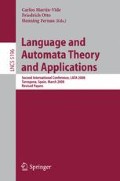Abstract
Minimalist Grammars were proposed in [15] as a formalization of the basic structure-building component of the Minimalism Program, a syntactic framework introduced in [2] and [3]. In the present paper we investigate the effects of extending this formalism with an unrestricted scrambling operator together with nondiscriminating barriers. We show that the recognition problem for the resulting formalism NP-hard. The result presented here is a generalization of the result shown by the author in [14] for Minimalist Grammars with unrestricted scrambling and category-sensitive barriers.
This research work has been supported by the Russian Foundation for the Humanities as a part of the project “The typology of free word order languages” (grant RGNF 06-04-00203a).
Access this chapter
Tax calculation will be finalised at checkout
Purchases are for personal use only
Preview
Unable to display preview. Download preview PDF.
References
Champollion, L.: Lexicalized non-local MCTAG with dominance links is NP-complete. In: Penn, G., Stabler, E. (eds.) Proceedings of Mathematics of Language 10. CSLI On-Line Publications UCLA (2007)
Chomsky, N.: The Minimalist Program. MIT Press, Cambridge (1995)
Chomsky, N.: Derivation by phase. In: Kenstowicz, M. (ed.) Ken Hale: A Life in Language, pp. 1–52. MIT Press, Cambridge (2001)
de Groote, P., Morrill, G., Retoré, C. (eds.): LACL 2001. LNCS, vol. 2099. Springer, Heidelberg (2001)
Frey, W., Gärtner, H.: On the treatment of scrambling and adjunction in Minimalist Grammars. In: Jäger, G., Monachesi, P., Penn, G., Wintner, S. (eds.) Proceedings of the 7th Conference on Formal Grammar, pp. 41–52 (2002)
Gärtner, H., Michaelis, J.: Some remarks on locality conditions and Minimalist Grammars. In: Gärtner, H., Sauerland, U. (eds.) Interfaces + Recursion = Language? Chomsky’s Minimalism and the View from Syntax and Semantics, pp. 161–195. Walter de Gruyter, Berlin (2007)
Harkema, H.: A characterization of Minimalist languages. In: de Groote, P., Morrill, G., Retoré, C. (eds.) LACL 2001. LNCS (LNAI), vol. 2099, pp. 193–211. Springer, Heidelberg (2001)
Jäger, G., Monachesi, P., Penn, G., Wintner, S. (eds.): FG-MOL 2005: Proceedings of the 10th conference on Formal Grammar and the 9th Meeting on Mathematics of Language, Edinburgh, Scotland (2005)
Kobele, G., Michaelis, J.: Two type 0-variants of Minimalist Grammars. In: Jäger, et al. (eds.) [8]
Michaelis, J.: Derivational Minimalism is mildly context-sensitive. In: Moortgat, M. (ed.) LACL 1998. LNCS (LNAI), vol. 2014, pp. 179–198. Springer, Heidelberg (2001)
Michaelis, J.: Transforming linear context-free rewriting systems into Minimalist Grammars. In: de Groote, P., Morrill, G., Retoré, C. (eds.) LACL 2001. LNCS (LNAI), vol. 2099, pp. 228–244. Springer, Heidelberg (2001)
Michaelis, J.: An additional observation on strict derivational Minimalism. In: Jäger, et al. (eds.) [8]
Michaelis, J., Gärtner, H.: A note on countercyclicity and Minimalist Grammars. In: Jäger, G., Monachesi, P., Penn, G., Wintner, S. (eds.) Proceedings of the 8th Conference on Formal Grammar, pp. 103–114 (2003)
Perekrestenko, A.: A note on the complexity of the recognition problem for the Minimalist Grammars with unbounded scrambling and barriers. In: Madrigal, V.D., de Ros Salamanca, F.E. (eds.) Actas del XXIII Congreso de la Sociedad Española para el Procesamiento del Lenguaje Natural, Seville, Spain. Revista de la SEPLN, vol. 39, pp. 27–34 (2007)
Stabler, E.: Derivational Minimalism. In: Retoré, C. (ed.) LACL 1996. LNCS (LNAI), vol. 1328, pp. 68–95. Springer, Heidelberg (1997)
Søgaard, A., Lichte, T., Maier, W.: On the complexity of linguistically motivated extensions of tree-adjoining grammar. In: RANLP 2007: Proceedings of the Conference on Recent Advances in Natural Language Processing, Borovets, Bulgaria (2007)
Author information
Authors and Affiliations
Editor information
Editors and Affiliations
Rights and permissions
Copyright information
© 2008 Springer-Verlag Berlin Heidelberg
About this paper
Cite this paper
Perekrestenko, A. (2008). Minimalist Grammars with Unbounded Scrambling and Nondiscriminating Barriers Are NP-Hard. In: Martín-Vide, C., Otto, F., Fernau, H. (eds) Language and Automata Theory and Applications. LATA 2008. Lecture Notes in Computer Science, vol 5196. Springer, Berlin, Heidelberg. https://doi.org/10.1007/978-3-540-88282-4_38
Download citation
DOI: https://doi.org/10.1007/978-3-540-88282-4_38
Publisher Name: Springer, Berlin, Heidelberg
Print ISBN: 978-3-540-88281-7
Online ISBN: 978-3-540-88282-4
eBook Packages: Computer ScienceComputer Science (R0)

